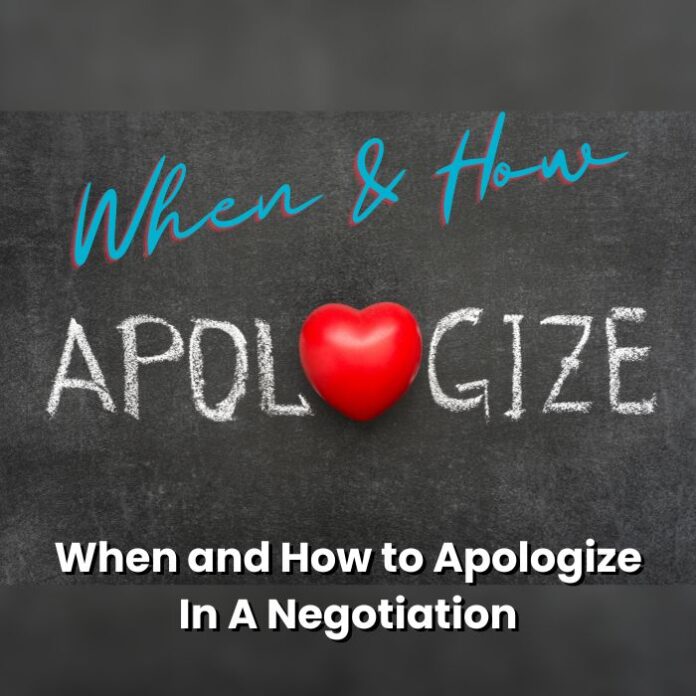A while back, I challenged you to do an ‘apology fast’, pointing out the perils of over-apologizing and inviting you to raise your awareness about how often you unnecessarily apologize. At the risk of sounding inconsistent, today I want to talk about the importance of knowing when and how to apologize. The issue arose recently when my daughter called me early one morning to let me know she was misinformed before entering into a negotiation, and found herself on the wrong side of the negotiation. She was asking for advice on how to proceed. That incident got me thinking about how this happens from time to time and that perhaps a follow up to my Apology Fast post would be in order to cover off the other side.
My daughter was worried that if she admitted she was mistaken, it would affect her credibility and impact her future negotiations. At the same time, she didn’t want to go forward with the negotiation knowing she was on the wrong side of the argument. These are typical concerns in this situation.
When we come into a negotiation we always want to assume we’re in the right. That our side is the ‘just’ side. To use a television show metaphor, that you’re wearing Olivia Pope’s white hat [Scandal]. But what happens when you come to the realization that you are on the wrong side in a negotiation?
Here are some tips I gave my daughter that day.
1.) Do your research and preparation
Preparation accounts for ~45% of success in a negotiation. Some experts put that number even higher. Suffice it to say, doing the preparation work in advance of a negotiation is critical. If you’re considering the 5 W’s [check out my ebook on this issue if you’re not familiar with that model] as I advocate, you should be fully exploring the ‘what’ – the substantive matter at issue. Always consider both (or all as the case may be) sides of the issue, knowing both your supporting facts and those that challenge your assertions. This is important so as to allow you to understand the other party’s perspective(s), to overcome objections where appropriate, and, of course, to ensure the validity of your own position.
In doing that prep work, you will typically uncover any weaknesses in your position and/or if the lay of the land is not as you initially thought. This allows you to modify your stance in advance of the negotiation.
Doing research was actually the way my daughter found out she was in the wrong, albeit a little late in the game. Had she done the requisite prep in advance, she likely wouldn’t have found herself in a compromised situation in the negotiation.
Having said that, even with the best research practices, things sometimes fall between the cracks and/or surprises arise, or perceptions may impact how we view an issue and require a perspective shift.
Regardless of how you end up in the position of being on the ‘wrong’ side of an issue or argument, how do you handle it when it happens?
2.) Acknowledge and Apologize.
When you find out you’re wrong, the best strategy is usually not to go silent, or ignore the other party, or focus on trying to figure out how to spin it, or continue to try to defend a position you no longer believe and continue the negotiation.
Most people assume that acknowledging an error or acknowledging we don’t know something will adversely impact on your credibility. In fact, the opposite is usually true. Owning up to errors and acknowledging when we don’t know (and undertaking to find out information) both build trust in relationships and increase your credibility.
So, if you find that you’re on the wrong side of an ‘argument’, acknowledge that fact. Give credit to the other party for raising your awareness on that particular issue. Be prepared to offer a simple and sincere apology.
And that’s it. Don’t try to defend your past position. Don’t draw out the acknowledgement or apology, making it awkward and making it a bigger deal than it needs to be. This simple strategy will serve to build better relationships and with it better outcomes.
My daughter’s acknowledgment and apology email response was sent as soon as she got off the call with me and took only 3 sentences. She received a response back immediately, saying: “Thank you, Jade. I really appreciate your honesty.” She built trust, rapport, mutual respect and in so doing paved the way for better negotiated solutions going forward.
3.) Don’t beat yourself up
You made a mistake. So what? Everyone does. Most likely, going in, you didn’t realize you were in the wrong. Yes you can, and should, learn from your mistake. But leave the guilt of your mistake in the past where it belongs.
If you got value from this article and you’d like to go deeper to find out how you can up level your negotiation skills to negotiate your best life, let’s connect





